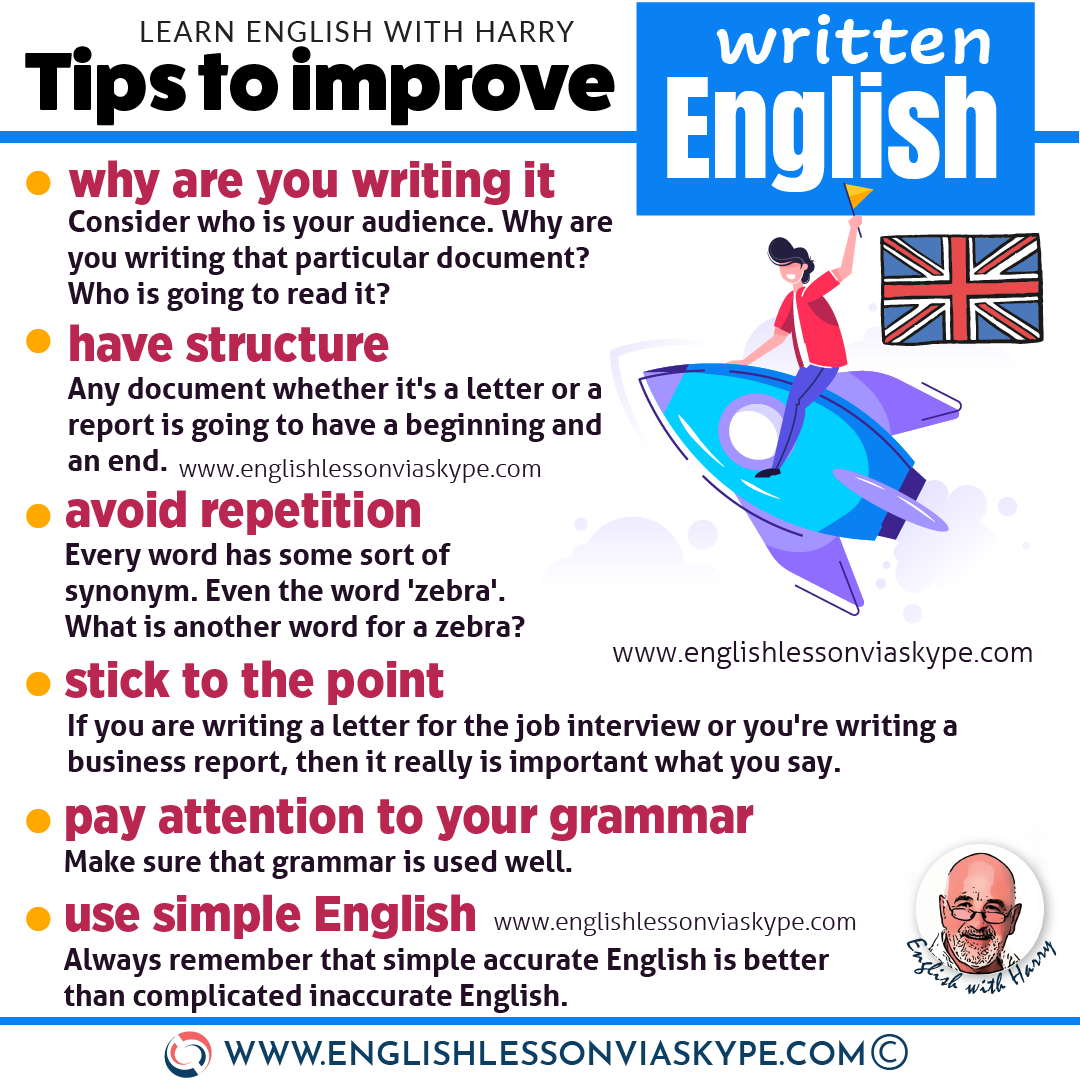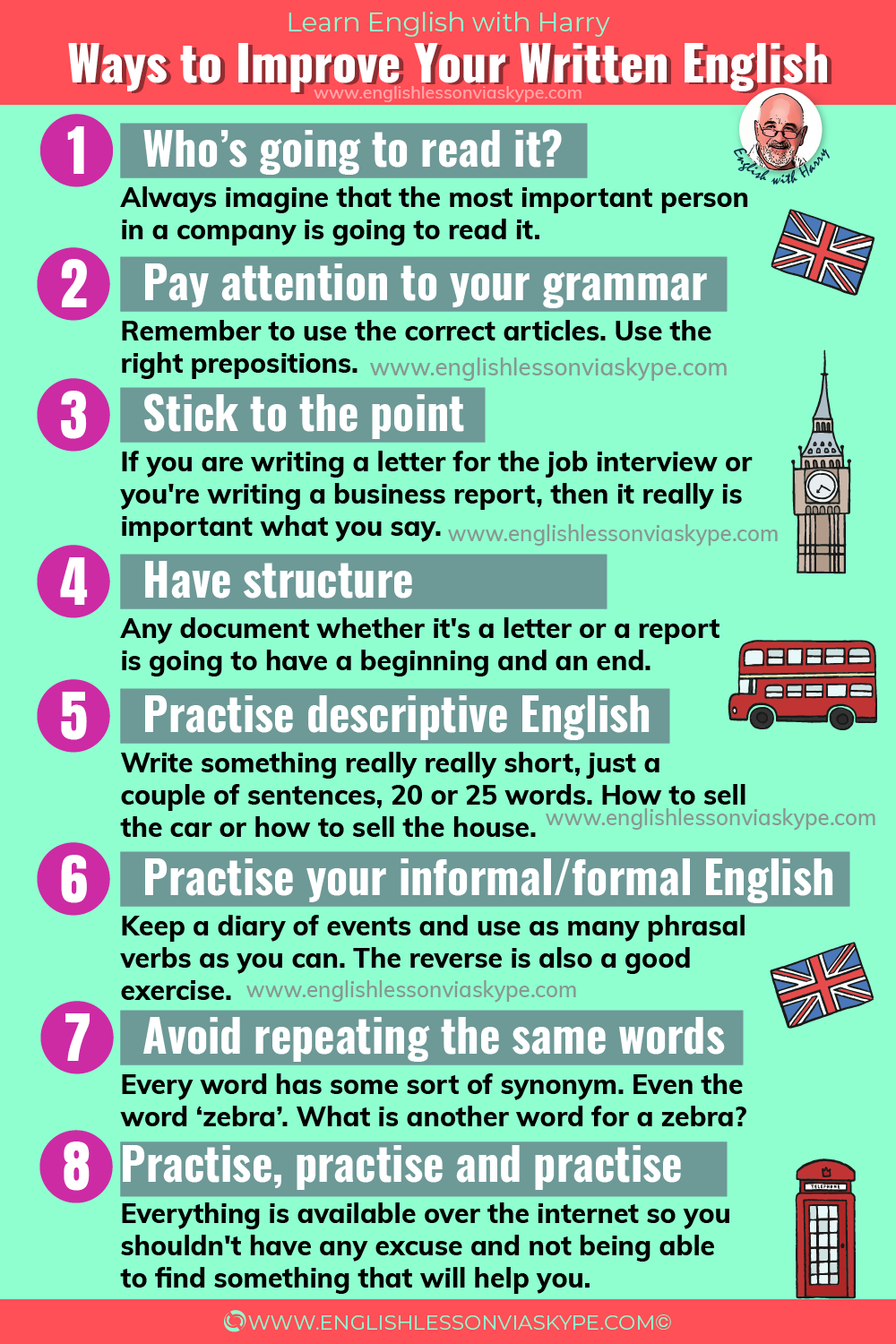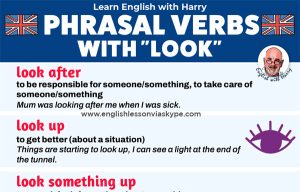Great tips to improve writing skills for non-native English speakers.
This advanced English lesson is a little bit different. I give 10 tips on how to improve your writing skills. Do not underestimate the power and importance of writing in English. You should not always write as though you’re sending a text message.
Listen to the podcast Speak Better English with Harry or watch it on YouTube at Learn English with Harry. englishclass101
Ways to improve written English
tips to improve writing skills for non-native English speakers
Harry
As I always tell students speaking and writing skills are very, very different. Two very different skill sets altogether.
When you’re speaking, it’s, of course, important to be correct and polite. But often when we speak about something, it’s forgotten about quite quickly.
Unfortunately, when we write something, it’s there on record. Mainly if we’re using email or some other form of text, it’s there for people to see, and they can read it several times. And therefore mistakes become a little bit more obvious. And we have to be really, really careful.
improve english on a budget
Online English Courses from €7.99
So I’ve got a 10-point plan here that will improve your writing, it will help you to improve your writing beyond what you would have expected.
keep it short and simple (KISS)
Start with short and simple sentences. I mean, this sounds really, really school-type approach, but it really does work.
Lots of people come to me and they want to write really complex sentences. And the problem with that is if you don’t have proper control of those sentences, you lose control of it. You lose the point that you’re trying to say and there’d be many, many more grammar mistakes than you had intended. So, from the very beginning until you get a little bit more professional in your writing, start with short and simple sentences or short simple structure.
❌ For me it’s very important our relationship because we are friends for 20 years.
✅ We are friends for 20 years. Our relationship is very important to me.
Keep it short and simple – KISS.
A general rule of thumb that I use.
If you want to state some facts, give some facts then use short sentences.
The population of the country is 1.5 million.
There are 50% of the population employed, and 30% of the population under the age of 18.
Use longer sentences if you want to describe something.
The short-legged barking dog was trying to behave like a wolfhound.
tips to improve writing skills for non-native English speakers

focus on getting your sentences correct
And brush up on your grammar. So really, really important at a very early stage to eliminate grammar mistakes. If you eliminate the grammar mistakes, then you can move on and start building those complex sentences.
Make sure to check:
- the use of articles
- correct prepositions
- subject in the right places
- correct tense
read as much and as often as you can
Reading will help you understand the structure of sentences.
But don’t read classic books so much.
They’re really beautiful books by Charles Dickens, or Bronte or whoever it might be that you’ve got an interest in, by all means, read them. But remember that you’re writing now in the 21st century.
So the books you should be reading if you want to improve your written skills, should be those books that were also written in the 20th and 21st centuries.
book your trial English Lesson
keep a diary
A diary is a great way to practise your writing. Write a few sentences about what you do or see every day. It will help you to write short stories in English.
sentence mining
You should always try and keep a notepad handy when you’re reading a book or you’re looking at the Internet. Because you might want to write down or capture really interesting sentences in the book that you hadn’t heard of.
avoid translating from your mother tongue into English
- causes hesitation
- forces you to use incorrect words
- you get no fluency
Take your time. Try to think in English. Using natural English collocations will help you. Collocation is a natural combination of two or more words.
be aware of the audience who’s going to read it
This is particularly important from a business perspective.
Always expect the most important person in your office to read it. This approach will help you write something as clear and as specific as you could be.
be careful about the language that you use
Make sure you understand the level of formality or the lack of it.
If we’re writing a business proposal or a business paper, we should always write it in a formal way. If we’re replying to a client, unless the client has asked us to be informal, then we should be more formal than informal.
If we’re writing emails to a colleague and the next floor, well, then, of course, we can be informal in that way. We don’t have to write everything so formal.
have a structure in mind
Think about the reasons why you’re writing this email/letter.
Follow a straightforward format of introduction, body text and closing.
And then when you’re thinking about that, what should be the tone? Is it formal or informal? Is it pleasant? Is it complaining? Are you going to be really strong or they’re going to be soft words, how are you going to write that?
So when you get that in your mind, then you can start writing.
tips to improve writing skills for non-native English speakers

letter of complaint
Tell them what you’re complaining about and why.
It didn’t work, and they wouldn’t replace it for you.
Tell them what you want to happen.
I want this product to be replaced.
I want my money back.
I would expect to get a reply within two days.
walk away from it for 30 minutes
Give yourself a little bit of time to check it.
Go back to it and read it and see, if you are happy with the way you’ve written it.
You might have written it much too formal. Or you might have written it in a much more hurtful tone than intended. Or you might it might be too harsh.
take an English class
Get a second pair of eyes to look at your written work. A good teacher will help you improve your vocabulary and avoid repetition in your written work.
feel free to make mistakes
If you don’t make mistakes, you don’t make anything, I absolutely guarantee.
Mistakes can be corrected. Put your thoughts down. See how they feel.
So that’s my 10-point plan for how you can improve your basic writing skills in English.
They’re not and it isn’t rocket science, a lot of it is common sense, but unless you know it, you can’t do it.
If you need more help, don’t hesitate to book a trial English lesson
Thanks for watching. Thanks for listening. Join me again soon.
speak better English with Harry podcast- episode 419
more information
For more information on English grammar rules, English collocations and English idioms, check out the links below:
Phrasal verbs about Crime and Scam
You can always study English advanced level at Learning English with the BBC and British Council Learn English.
You will love these English lessons

English Phrasal Verbs with LOOK
Phrasal verbs with look. Learn English vocabulary. Online English lessons on Zoom and Skype.


Difference Between So And Too
Learn the difference between so and too in this very short English lesson. Understand how to use so and too


Get Cracking Meaning
Get cracking meaning explained in detail. Welcome to Harry’s English in a Minute. Watch this short English video lesson with

